时间状语的短语前何时加介词
干货:介词for用法:for时间段可用于至少13种时态
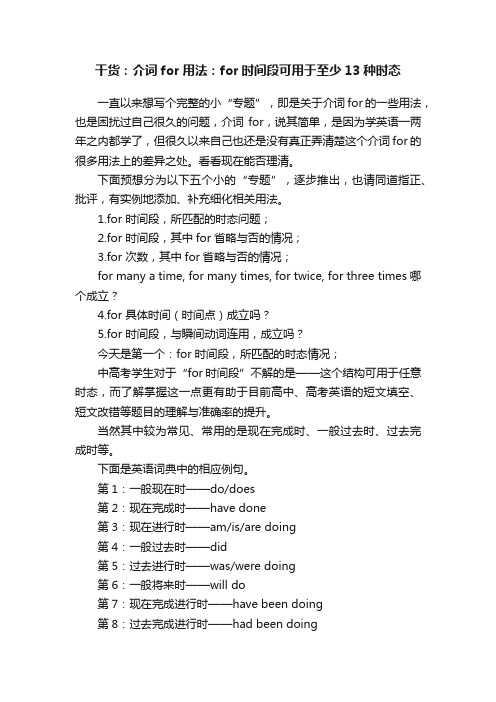
干货:介词for用法:for时间段可用于至少13种时态一直以来想写个完整的小“专题”,即是关于介词for的一些用法,也是困扰过自己很久的问题,介词for,说其简单,是因为学英语一两年之内都学了,但很久以来自己也还是没有真正弄清楚这个介词for的很多用法上的差异之处。
看看现在能否理清。
下面预想分为以下五个小的“专题”,逐步推出,也请同道指正、批评,有实例地添加、补充细化相关用法。
1.for 时间段,所匹配的时态问题;2.for 时间段,其中for省略与否的情况;3.for 次数,其中for省略与否的情况;for many a time, for many times, for twice, for three times哪个成立?4.for 具体时间(时间点)成立吗?5.for 时间段,与瞬间动词连用,成立吗?今天是第一个:for 时间段,所匹配的时态情况;中高考学生对于“for 时间段”不解的是——这个结构可用于任意时态,而了解掌握这一点更有助于目前高中、高考英语的短文填空、短文改错等题目的理解与准确率的提升。
当然其中较为常见、常用的是现在完成时、一般过去时、过去完成时等。
下面是英语词典中的相应例句。
第1:一般现在时——do/does第2:现在完成时——have done第3:现在进行时——am/is/are doing第4:一般过去时——did第5:过去进行时——was/were doing第6:一般将来时——will do第7:现在完成进行时——have been doing第8:过去完成进行时——had been doing第9:将来完成进行时——will have been doing 将来完成进行时第10:过去将来完成进行时——would have been doing第11:过去将来时——would do/was, were going to do第12:将来完成时——will/shall have done第13:过去将来完成式——would have done曾考过一本书写过介词for 时间段,可以同任意时态连用,但笔者目前只是累积查找了以上13种可以同介词for 时间段搭配的时态例句(欢迎补充)。
英语介词的使用
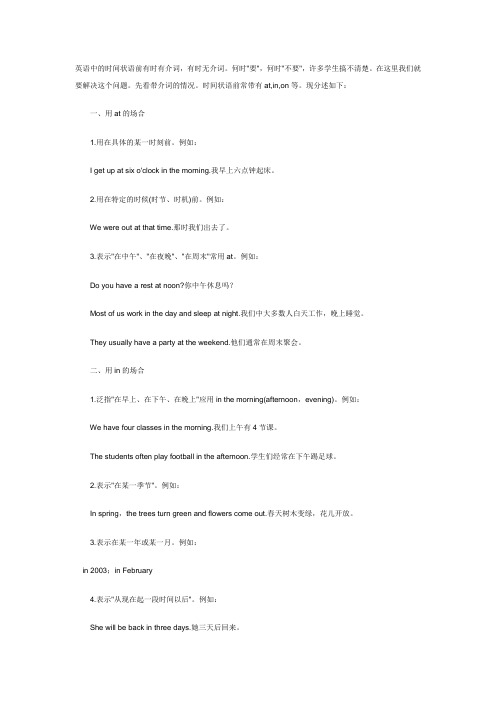
英语中的时间状语前有时有介词,有时无介词。
何时"要",何时"不要",许多学生搞不清楚。
在这里我们就要解决这个问题。
先看带介词的情况。
时间状语前常带有at,in,on等。
现分述如下:一、用at的场合1.用在具体的某一时刻前。
例如:I get up at six o'clock in the morning.我早上六点钟起床。
2.用在特定的时候(时节、时机)前。
例如:We were out at that time.那时我们出去了。
3.表示"在中午"、"在夜晚"、"在周末"常用at。
例如:Do you have a rest at noon?你中午休息吗?Most of us work in the day and sleep at night.我们中大多数人白天工作,晚上睡觉。
They usually have a party at the weekend.他们通常在周末聚会。
二、用in的场合1.泛指"在早上、在下午、在晚上"应用in the morning(afternoon,evening)。
例如:We have four classes in the morning.我们上午有4节课。
The students often play football in the afternoon.学生们经常在下午踢足球。
2.表示"在某一季节"。
例如:In spring,the trees turn green and flowers come out.春天树木变绿,花儿开放。
3.表示在某一年或某一月。
例如:in 2003;in February4.表示"从现在起一段时间以后"。
例如:She will be back in three days.她三天后回来。
状语的比较与翻译

状语是修饰动词,形容词,副词,各类短语或整个小句的语法成分。
按其用途,可以分为:时间状语,地点状语,方式状语,原因状语,结果状语,目的状语,条件状语让步状语,程度状语,方式状语,伴随状语等。
He lives over the mountain.I was suiprised at what she said.China is very rich in natural resources.It rained heavily,causing severe flooding in that country.位置一般说来,在英语中:形容词副词状语的中心语为各类短语状语位于中心语之前分句整个句子具体说来,包括下列几种情况1.副词修饰形容词,副词和动词充当的中心语。
(同中文)Most of the buildings are amazing skyscrapers and everywhere you can see people in their tuxedos walking extremely fast on the busy streets.2.状语修饰整个句子,通常在句首:意义上:解释说明整个句子或者表明说话人的态度。
形式上:一般是副词,如honestly,frankly,naturally介词短语,如in one’s opinion,of course,at first非限定分句to be sure,无动词分句whatever the reason,whether by accident or by design.例:Naturally,we should strengthen our cultural ties with other people.当然,我们应当加强与别国人民的文化联系。
注意:某些表说话人看法或态度的词,负载信息量大,经常放在其他位置。
翻译时可独立成句。
He is admittedly reliable. 他十分可靠,这是大家公认的。
初中英语介词用法归纳整理
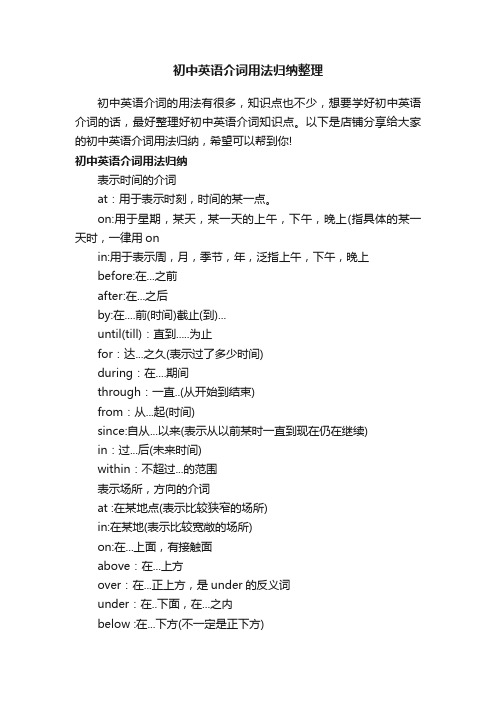
初中英语介词用法归纳整理初中英语介词的用法有很多,知识点也不少,想要学好初中英语介词的话,最好整理好初中英语介词知识点。
以下是店铺分享给大家的初中英语介词用法归纳,希望可以帮到你!初中英语介词用法归纳表示时间的介词at:用于表示时刻,时间的某一点。
on:用于星期,某天,某一天的上午,下午,晚上(指具体的某一天时,一律用onin:用于表示周,月,季节,年,泛指上午,下午,晚上before:在...之前after:在...之后by:在....前(时间)截止(到)...until(till):直到.....为止for:达...之久(表示过了多少时间)during:在....期间through:一直..(从开始到结束)from:从...起(时间)since:自从...以来(表示从以前某时一直到现在仍在继续)in:过...后(未来时间)within:不超过...的范围表示场所,方向的介词at :在某地点(表示比较狭窄的场所)in:在某地(表示比较宽敞的场所)on:在...上面,有接触面above:在...上方over:在...正上方,是under的反义词under:在..下面,在...之内below :在...下方(不一定是正下方)near:近的,不远的by:在...的旁边,比near的距离要近between:在两者之间among:在三者或者更多的之中around:环绕,在...的周围,在....的四周in front of:在...的前面behind:在...后边in:在..之内,用于表示静止的位置into:进入out of :和into一样,也表示有一定的运动方向along:沿着across:横过(平面物体)through:贯通,通过to :达到..地点(目的地)或方向for:表示目的,为了.....from:从...地点起其他介词with:和..在一起; 具有,带有; 用某种工具或方法in:表示用什么材料(例如:墨水,铅笔等)或用什么语言。
[英语日期表达法]英语日期表达法口诀
![[英语日期表达法]英语日期表达法口诀](https://img.taocdn.com/s3/m/969117de83c4bb4cf6ecd128.png)
[英语日期表达法]英语日期表达法口诀英语中年份,日期和时间的表达法1、年份关于四位数年份的读法有下列几种情形:(1) 一般情况下,将表示年份的四个数字按前后分为两组,每一组的数字都按基数词来读。
例如:1865年读作eighteen sixty-five1998年读作nineteen ninety-eight(2) 如果是整百的年,后面的两个“零”读为hundred。
例如:1900年读作nineteen hundred1800年读作eighteen hundred(3) 十位数字上为“零”,该“零”读为字母O的发音。
例如:1809年读作eighteen O nine(4) 关于千年的一些读法。
20XX年读作two thousand 或twenty hundred20XX年读作two thousand and eight 或twenty O eight 1008年读作one thousand and eight 或ten O eight(5) 三位以内数字的年份,它们有两种读法:一种是按照基数词的方法来读,另一种是一个一个数字来读。
例如:531 BC读作five three one BC或five hundred and thirty-one BC2、日期日期的写法可以采用基数词和序数词两种形式。
例如:March 1也可以写成March 1st;May 29也可以写成May 29th。
但是,日期的读法只能用序数词的形式。
例如:October 31(October 31st)读作October(the)thirty-first August 26(August 26th)读作August(the)twenty-sixth3、时间时间的读法有以下一些特点:(1) 可以直接按照表示时间的数字来读。
例如:10:56读作ten fifty six8:30读作eight thirty(2) 正点后的前半小时,通常说几点“过”(past)几分。
状语从句在复合句中起状语作用的从句叫状语从句。有的状语

名词(这时他们是介词):
She waited a little while before making up her mind. 她等一会儿才做出决定。
After sending you that letter I recollected how stupid I was. 把信寄给你之后我想起我多么愚蠢。
其中的一个。
(4) for 也常引导表示原因的分句,但 for是并列连词,因此不能用于句首;for 提供的理由是一种补充性的说明,且 for 前常有逗号:
The days are short, for it is now December. 白天短了,因为已是12月了。 (四) 目的状语从句
引导目的状语从句的连词:in order that, so that(为了);for fear that, in case, lest(以免)等。
作相并发生,常可译作“一边……一边”:
When he returned, his wife was cooking. 他回来时,他妻子在烧饭。
While he was reading(或read), his wife was cooking(或cooked). 他看书时,他妻子一直烧饭。
As he was reading(或read), he was listening(或listened) to the radio. 他边看书边听广播。
1、 because, since, as 都可表示“因为”。
(1) because 表示原因的语气最强, 通常回答以疑问词why 引导的问句,除 特别强调外,该从句一般位于主句后; since 表示稍加分析后而推断出来的原 因,比as 正式;as 表示对方已知道的原 因。since 和 as 不回答why 引导的疑问 句,而且其从句一般放在句首:
when的用法总结大全

when的用法总结大全when的用法你知道多少,今日我给大家带来when的用法,盼望能够关心到大家,下面我就和大家共享,来观赏一下吧。
when的用法总结大全when的意思adv. 什么时候,(用于时间的表达方式之后)在那时,其时,当时conj. 在…时,既然,假如pron. 什么时候,那时n. 时间,时候,日期,场合when用法when可以用作副词when的基本意思是“什么时候”。
可用作疑问副词,用来询问某事曾发生或将要发生的时间,引导特别疑问句; 还可用作关系副词引导限制性定语从句、非限制性定语从句和表语从句,表示“是…时候的事”。
when可用作从属连词,引导状语从句,表示时间时作“当…时,在…的时候”解; 表示条件时作“假如,要是”解; 表示对比时作“既然,考虑到”解。
当when所引导的从句的主语和主句的主语全都时,常将其主语、系动词或助动词省去,只留实义动词或表语,或者改写为短语。
when所引导的时间状语从句用一般现在时代替将来时,用现在完成时代替将来完成时。
when用作副词的用法例句When did that happen?那件事是什么时候发生的?They stood respectfully when he entered the room.当他走进房间时,他们都恭尊敬敬地站着。
Iron will melt when it is made very hot.当铁烧得很热时就会熔化的。
when可以用作连词when可用作从属连词,引导状语从句,表示时间时作“当…时,在…的时候”解; 表示条件时作“假如,要是”解; 表示对比时作“既然,考虑到”解。
当when所引导的从句的主语和主句的主语全都时,常将其主语、系动词或助动词省去,只留实义动词或表语,或者改写为短语。
when所引导的时间状语从句用一般现在时代替将来时,用现在完成时代替将来完成时。
when用作连词的用法例句And they roared when Seaman held up two fingers.然后当希曼伸出两根指头的时候他们就吼叫起来。
英语语法介词用法3篇

英语语法介词用法3篇工欲善其事,必先利其器。
愿你从容不迫,待你潇洒凯旋。
中考不退却,逆袭全世界。
今日有心苦勤奋,明朝一举步青云。
下面是小编给大家带来的英语语法介词用法,欢迎大家阅读参考,我们一起来看看吧!英语语法:介词介词介词不能单独使用,必须和名词、代词或动名词构成介词短语,在句中做表语,定语、状语、补语等成分。
根据介词的用法,通常可以分为:时间、地点、趋向和其他四类介词。
一、表示时间的介词:(1) at 示时刻、时间的某一点 at six, at noon, at half past one, at that time / momenton 体的某一天on Sunday, on Friday afternoon, on a cold morning,on the morning of … on March 12th, 2005in 示周、月、季节、年以及泛指的上、下午,晚上in spring, in 2004, in the morning,在his, last,that, next, every 等词前面不用介词this afternoon, last Sunday, every morning区别:next week -------- the next week(2) by “在……前” 多和完成时态连用till “直到……才” I’ll wait here till you come back.until “不到……就不” 常和until连用I’ll not leave until you come back.(3) in 过……以后, 大多用于将来时 after 多用于过去时(4) since + 过去的一个时间点 (表示时间段, 从……开始到现在)for + 一段时间二、表示场所、方向的介词:(1)at 表示比较具体的地点 at 37 Renming Roadin 表示比较宽敞的地点 in Renming Street(2)above斜上方-------below斜下方over正上方-------under 正下方on 两物体有接触(3) between…and..在……和……之间 among在……中间(三者以上)(4) across (从物体表面)跨越, 越过 through (从物体中间)穿透, 穿越(5)in 在……里面(表示静止的位置) into 进入,表示运动方向,常用在表示动作的动词之后, 如 go, come, walk, jump, run 等 into的反义词是out of(6)to 到 (目底地)或方向 towards 指朝着某方向,而不是目的地.He walked towards the beach.三、其它介词1.with (1)在一起; (2)有; (3)用某种工具in 用什么材料或语言,或表示衣着,声调特点等by 用......手段2.Like 象......一样as 作为;按照,象......一样(连词)+ 句子3.for(1)为了(表示目的或原因) (2)(后面加一段时间)表示时间段英语中考:介词短语[介词短语聚焦]“介词+名词/代词”所构成的短语称为介词短语。
介词--盖老师英语

介词--盖老师英语介词+代词(代词一定用宾格);介词+动词(动词一定是ing形式)介词短语只要超过2个单词,一般放在名词的后面介词短语作定语时,避免头重脚轻只能放在被修饰的名词之后。
in大/at小的区别:at所在地有具体的人,如学校。
in所在地没有具体的人,如北京等1、介词的主要用法: 介词是一种虚词,不能独立使用。
介词之后一-般有名词或代词(宾格)或相当于名词的其他词类、短语或从句作它的宾语,即构成介词短语。
有些介词是由两个以上的词构成的短语介词。
如: out of(从...中出来),because of(因为),away from(距离...),on top of(在...顶上),ever since(自,从...):现在完成时的标志词next to(在...隔壁):==besideaccording to(根据..) in front of(在...前方)等.。
2、分类地点(位置、范围)介词:above在...前(靠前或上,不一定是正上方)与below对应about在..附近:不远处(还有关于的意思)across在...对面after在...后面against倚着...,along在...近旁:沿着...among在...中间:3者以上around在...周围:一般放名词之前round在...周围:一般放名词之后或单独使用at在...处:小地点/小时间before在... 前behind在..后up在... 上面:below低于...beside在...旁边:不能加s,加了s就是除了什么的意思了between在...之间:2者之间by在..旁:和beside意思一样down在...下面from来自...in在... 里面:大的时间、大的地点inside在... 里面:比In更强调在里面near靠近...of在..之中on在... 上面out of在..之外outside在...外面over在.... 上方(垂直正上方)under在... 下方(垂直正下方)on top ofL在..顶部in front of在...前:in the front of(更密闭的空间里的前面)close to靠近: to后如果出现动词,要用动词ing形式;否则是加动词的原形in the middle Oof在...的中间,at the end Of在...的末端,等等。
初中英语语法知识点总结及练习
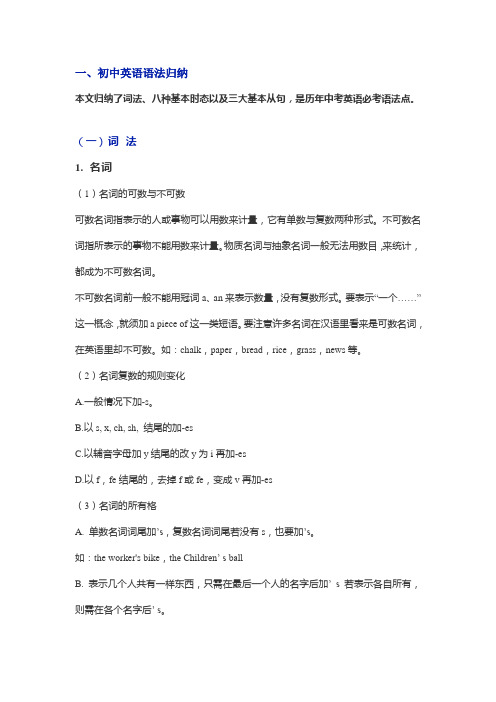
一、初中英语语法归纳本文归纳了词法、八种基本时态以及三大基本从句,是历年中考英语必考语法点。
(一)词法1. 名词(1)名词的可数与不可数可数名词指表示的人或事物可以用数来计量,它有单数与复数两种形式。
不可数名词指所表示的事物不能用数来计量。
物质名词与抽象名词一般无法用数目,来统计,都成为不可数名词。
不可数名词前一般不能用冠词a、an来表示数量,没有复数形式。
要表示“一个……”这一概念,就须加a piece of这一类短语。
要注意许多名词在汉语里看来是可数名词,在英语里却不可数。
如:chalk,paper,bread,rice,grass,news等。
(2)名词复数的规则变化A.一般情况下加-s。
B.以s, x, ch, sh, 结尾的加-esC.以辅音字母加y结尾的改y为i再加-esD.以f,fe结尾的,去掉f或fe,变成v再加-es(3)名词的所有格A. 单数名词词尾加’s,复数名词词尾若没有s,也要加’s。
如:the worker's bike,the Children’ s ballB. 表示几个人共有一样东西,只需在最后一个人的名字后加’ s若表示各自所有,则需在各个名字后’ s。
如:This is Lucy and Licy’ s room.These are Kate's and jack’ s rooms.C. 如果是通过在词尾加—s构成的复数形式的名词,只加’。
如:the students’ books,the girls’ blouses(另外:名词+of+名词名词是有生命的,我们就用’s结构来表示所有关系。
如果名词所表示的事物是无生命的,我们就要用名词+of+名词的结构来表示所有关系。
) 2. 代词人称代词,物主代词,反身代词,指示代词,不定代词(1)人称代词第一人称单数I me my mine myself复数 we us our ours ourselves第二人称单数 you you your yours yourself复数 you you your yours yourselves第三人称单数 he him his his himselfshe her her hers herselfit it its its itself复数 they them their theirs themselves(2)物主代词物主代词的用法:形容词性物主代词后面一定要跟上一个名词;名词性物主代词可作主语、表语、宾语。
高中英语状语从句知识点及练习

高中英语---状语从句一、概念:状语通常由副词、介词短语、动词不定式、分词和从句等担当。
?? ???状语从句主要用来修饰主句或主句的谓语。
一般可分为九大类,状语从句的关键是要掌握引导不同状语从句的常用连接词和特殊的连接词。
二、分类及使用1.?时间状语从句?(1)?when ?①.when引导的时间状语从句,其动词既可以是延续性动作的动词,也可以是瞬间性动作的动词,可以表示主句的动作和从句的动作同时发生,或从句的动作发生在主句的动作之前。
?when?you?apply?for?a?job,?you?must?present?your?credentials.?②?when还可表示just?then(正在那时)的意思,此时所引导的从句放在主句之后。
?we?were?about?to?start?when?it?began?to?rain.?(2)?as引导的时间状语从句?as侧重表示主句和从句的动作并相发生,翻译成一边,一边。
? We?were?having?breakfast?as?she?was?combing?her?hair.(3)?while “在…期间”,所引导的从句的动作是延续性的,并表示和主句的动作同时发生。
? ?(4)?before引导?①?before“在…之前”?I’ll?be?back?before?you?have?left.??②?before“…之后才”?It?may?be?many?years?before?we?meet?again.??(5)?as?soon?as/once/directly/the?instant等引导as?soon?as?是最常见的表示“一…就”的从属连词,其他连词还有immediately,instantly,the?instant?(that),the?minute(that)?,the?moment(that)等,它们通常都可与as?soon?as换用。
英语语法大全

英语语法大全英语语法是针对英语语言的语法进行的研究,指英语中语言的结构规律。
包括词法和句法。
英语的语法既可以是规范性的,也可以是描述性的。
一、实词1.名词(nouns)n.:名词是词性的一种,也是实词的一种,是指代人、物、事、时、地、情感、概念等实体或抽象事物的词。
名词可以独立成句。
在短语或句子中通常可以用代词来替代。
名词可以分为专有名词(Proper Nouns)和普通名词(Common Nouns),专有名词是某个(些)人,地方,机构等专有的名称,如Beijing,China等,专有名词的首字母要大写。
普通名词是一类人或东西或是一个抽象概念的名词,如:book,sadness等。
2.代词(pronoun)pron.:代词是代替名词的一种词类。
大多数代词具有名词和形容词的功能。
英语中的代词,按其意义、特征及在句中的作用分为:人称代词、物主代词、指示代词、反身代词、相互代词、疑问代词、关系代词、连接代词和不定代词九种。
3.数词(numeral)Num.:表示“多少”和“第几”的词,叫数词。
其用法相当于名词或者形容词。
数词分为基数词和序数词两种。
4.形容词(adjective)adj.或a.:很多语言中均有的主要词类中的一种。
主要用来修饰名词的词,表示事物的特征。
形容词用来修饰名词或代词,表示人或事物的性质、状态,和特征的程度好坏,与否。
5.副词(adverb)adv.:是一种用来修饰动词、形容词、全句的词,说明时间、地点、程度、方式等概念的词。
副词是一种半虚半实的词。
副词可分为:时间副词、地点副词、方式副词、程度副词、疑问副词、连接副词、关系副词、频率副词和说明性副词等。
6.动词(Verb)v.:动词,就是用来形容或表示各类动作的词汇。
基本上每个完整的句子都有一个动词,要表示第二个动作时可使用不定词、动名词、对等连接词、从属连接词或增加子句等方法连结。
[1]二、虚词7.冠词(article) art.:冠词是虚词,本身不能单独使用,也没有词义,它用在名词的前面,帮助指明名词的含义。
语文多项状语排列顺序口诀
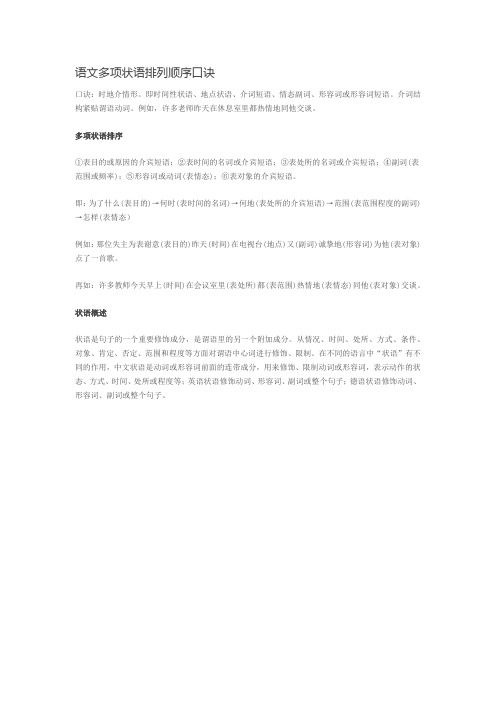
语文多项状语排列顺序口诀
口诀:时地介情形。
即时间性状语、地点状语、介词短语、情态副词、形容词或形容词短语。
介词结构紧贴谓语动词。
例如,许多老师昨天在休息室里都热情地同他交谈。
多项状语排序
①表目的或原因的介宾短语;②表时间的名词或介宾短语;③表处所的名词或介宾短语;④副词(表范围或频率);⑤形容词或动词(表情态);⑥表对象的介宾短语。
即:为了什么(表目的)→何时(表时间的名词)→何地(表处所的介宾短语)→范围(表范围程度的副词)→怎样(表情态)
例如:那位失主为表谢意(表目的)昨天(时间)在电视台(地点)又(副词)诚挚地(形容词)为他(表对象)点了一首歌。
再如:许多教师今天早上(时间)在会议室里(表处所)都(表范围)热情地(表情态)同他(表对象)交谈。
状语概述
状语是句子的一个重要修饰成分,是谓语里的另一个附加成分。
从情况、时间、处所、方式、条件、对象、肯定、否定、范围和程度等方面对谓语中心词进行修饰、限制。
在不同的语言中“状语”有不同的作用,中文状语是动词或形容词前面的连带成分,用来修饰、限制动词或形容词,表示动作的状态、方式、时间、处所或程度等;英语状语修饰动词、形容词、副词或整个句子;德语状语修饰动词、形容词、副词或整个句子。
有关英语中时间前加介词的问题

有关英语中时间前加介词的问题我们知道,名词作状语前面一般都有介词。
如:My father goes to work at eight in the morning. 我父亲在早晨8点钟上班。
但现代英语中,介词在很多情况下可以省略:1.紧接在指示词last、next、this、that之前的时间介词at、on、in总是省略。
We will go and watch a movie this evening. 今天晚上我们要去看电影。
We visited the Great Wall last week. 我们上周参观了长城。
注意:a. 词义中含有last、next、this意义的名词前一般也不用时间介词。
They will help us plant trees tomorrow afternoon. 明天下午他们要帮助我们种树。
b. 如果不是介词at、on、in,而是其它类型的介词一般不能省略。
如:I haven’t seen him since last week. 自从上周我就没有见过他。
c. 某些指示短语表示的时间跟目前有一定的间隔,前面的介词可有可无。
如:I saw Li Ping when I was walking along the street the day before last. 前天我沿街走路时看见了李平。
2.含有every 等频率标志的短语前不用介词。
如:Every evening I go out for a walk in the park. 每天晚上我都去公园散步。
3.由on引出的特定日子,可以省略介词on。
I can see him (on) Christmas Day. 圣诞节我可以看见他。
注意:表示在某星期时,介词on可有可无:On Mondays we have a class meeting. 星期一我们开班会。
4.for通常引出一段时间,当与表示静态的动词连用时可以省略。
定语从句中关系副词的用法
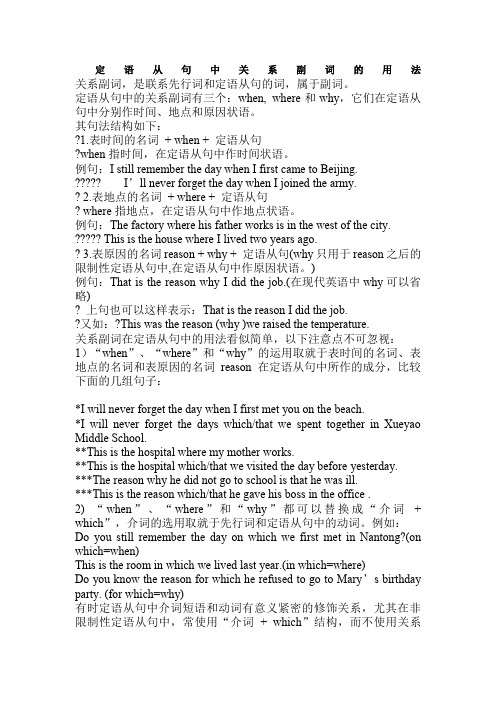
定语从句中关系副词的用法关系副词,是联系先行词和定语从句的词,属于副词。
定语从句中的关系副词有三个:when, where和why,它们在定语从句中分别作时间、地点和原因状语。
其句法结构如下:?1.表时间的名词+ when + 定语从句?when指时间,在定语从句中作时间状语。
例句:I still remember the day when I first came to Beijing. ????? I’ll never forget the day when I joined the army.? 2.表地点的名词+ where + 定语从句? where指地点,在定语从句中作地点状语。
例句:The factory where his father works is in the west of the city. ????? This is the house where I lived two years ago.? 3.表原因的名词reason + why + 定语从句(why只用于reason之后的限制性定语从句中,在定语从句中作原因状语。
)例句:That is the reason why I did the job.(在现代英语中why可以省略)? 上句也可以这样表示:That is the reason I did the job.?又如:?This was the reason (why )we raised the temperature.关系副词在定语从句中的用法看似简单,以下注意点不可忽视:1)“when”、“where”和“why”的运用取就于表时间的名词、表地点的名词和表原因的名词reason在定语从句中所作的成分,比较下面的几组句子:*I will never forget the day when I first met you on the beach.*I will never forget the days which/that we spent together in Xueyao Middle School.**This is the hospital where my mother works.**This is the hospital which/that we visited the day before yesterday.***The reason why he did not go to school is that he was ill.***This is the reason which/that he gave his boss in the office .2) “when”、“where”和“why”都可以替换成“介词+ which”,介词的选用取就于先行词和定语从句中的动词。
病句之语序不当
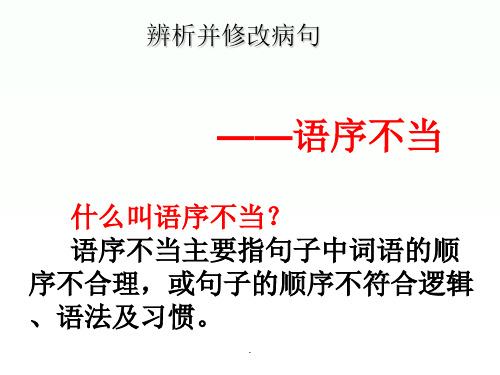
(4)规律标志法。有些句子本身具有一定的标志,其语病往往就出
现在那些有标志的部位。
①注意关联词语与主语的位置。前后分句主语一致主语在前,不一致
关联词语在前。
②出现并列短语(带有“和”“或”顿号等)注意查找逻辑上的先后
顺序。
③被字句、把字句,前面加否定词或能愿动词要放在“把”和“被”
的前面。
.
三、巩固提高
语序不当。并列成分前后照应不周,“深刻的说明”应照应“理论 ”,“详细的规定”应照应“政策”。
.
五、分句位置不当
例1:这个村很好地执行了党的富民政策,现在 不但向国家交售了六万斤公粮,而且不吃国家 救济粮了。
(递进关系不当,应改为“不但不吃国家救济粮了,而 且向国家交售了六万斤公粮”)
例2:他们不仅能够用邓小平理论来指导自己的 工作,而且能深刻领会邓小平理论的精神实质。
• 句中定语“180多家”的位置不当,应放“ 单位”前面。
• 10.“2006中国沈阳世界园艺博览会”是 世界园艺博览会历届占地面积最大、活动 最丰富、演艺最精彩的一次盛会。
• “世界园艺博览会历届”语序不当,应为 “历届世界园艺博览会”。
.
• 11.近年来,随着教育教学改革的不断深化, 高校学生的培养深受社会广大用人单位的欢迎 ,就业率明显提高。
• 2.批评和自我批评是有效的改正错误提高思想 水平的方法。
• 3.为了争取高速度,我们必须狠抓科学技术的现 代化,把国民经济用先进的科学技术搞上去。
• 4.这期研究班是全国职工教育管理委员会和国家 经委联合ห้องสมุดไป่ตู้今年5月底举办的。
.
练习解析
• 1.将“我们几个团的负责干部”改为“团的我们 几个负责干部”,以消除歧义。
before after 的用法
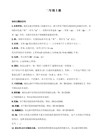
Your name comes before mine on the list.
名单上你的名字在我之前。
⒋)在某人面前,如:
She said it before the witness.
他是当着证人的面说的。
二、作为连词
其基本含义是“在……之前”,又可以根据不同语境灵活翻译成“才”、“还没来得及就……”、“趁……”、“就”等。具体用法如下:
⒈)与情态动词can/could连用
这时候从句虽为肯定形式,根据汉语表达习惯译成“还没来得及就”,如:
Before I could get in a word,he had measured me.
我还没来得及插话他就为我
量好了尺寸。
while 用作连词时,有以下几种含义:
1. 意为“当……时候,和……同时”,引导时间状语从句。例如:
While I was watching TV, the bell rang.
我看电视时,铃响了。
Meimei watched TV while she ate her supper.
5. 用于句型“it was +时间段+ before …” 表示 “过了多久才…”
It was three days before he came back. .
6. 用于句型“ it was not long +时间段+ before …” 意为“不久就….”
It was not long before he sensed the danger of the position .
I’ll leave when he comes back. 他回来后我就离开。
介词和介词短语

4) 表示“支持,反对”的介词 against:意为“反对”,指在观点或主张方 面与某人采取对立的态度。 for: 指在观点或主张等方面与某人采 取一致的态度,意思是“支持, 赞成”,与in favor of 同义。 注意: against还有“倚着,靠着”的意思。 e.g. His bed is against the wall. 他的床靠墙放着。
(3) near,beside,by beside和near都有“靠近”的意思, beside强调“在……旁边(=at the side of)”, 指两者的位置关系,多用于人; near意为“在……附近(=at a short distance from)”,表示两者之间的距离, 多用于场所,另外near还可表示时间或程 度等。 by表示“在……旁边”时含有“倚,凭, 靠,沿着”等意。
except for:意为“除……之外”,它的含义 是 肯定句子主体,排除局部。 besides:意为“除……之外(还有……)”。 注意: besides还可用作副词,意为“而且;还有”。 e.g. I don't want to go; besides, I am too tired. 我不想去了,再说我也太累了。
② below,under,beneath皆可表示 “在……之下”。 below表示不垂直并与表面不接触的下方; under表示垂直并与表面不接触的下方; beneath表示在某物之下,可以表示垂直 或不垂直,也可以表示上下接触的意思。
(2) in front of,in the front of 两个介词短语皆有“在前面”的意思, 区别是: in front of通常相对于某物体的外部来 说,指某人或某物位于该物前面,意为 “在……前面”; in the front of通常相对于空间而言,指 某人或某物位于某个空间的内部,意为 “在……的前部”。
- 1、下载文档前请自行甄别文档内容的完整性,平台不提供额外的编辑、内容补充、找答案等附加服务。
- 2、"仅部分预览"的文档,不可在线预览部分如存在完整性等问题,可反馈申请退款(可完整预览的文档不适用该条件!)。
- 3、如文档侵犯您的权益,请联系客服反馈,我们会尽快为您处理(人工客服工作时间:9:00-18:30)。
英语中作时间状语的短语前通常要加in, on, at, for等介词。
例如:
I get up at six o’clock in the morning. 我早上六点钟起床。
但在下列情况下,时间状语前不用介词:
1)当时间状语是today, tonight, yesterday, yesterday morning/ afternoon/ evening, tomorrow, tomorrow morning/ afternoon/evening等时。
例如:
There was a play yesterday afternoon.昨天下午有一场戏。
She will be back tomorrow morning.她明天上午回来。
2)由this, that ,these等构成的短语用作时间状语时,其前不用介词。
例如:
This term we are going to have a new subject.这学期我们将有一门新的课程。
He didn’t go home that night.那天晚上他没回家。
They are working on the farm these days. 这些天他们在农场工作。
3)由形容词last, next等修饰的名词词组用作时间状语时,其前不用介词。
例如:
I saw him in the street sometime last week.上星期我在街上看见过他。
Please come here earlier next time下次请早点来这儿。
4)由every, each等构成的短语用作时间状语时,其前不用介词。
例如:
Do you do morning exercises every day? 你们每天做早操吗?
They go to school by bike each day. 他们每天骑自行车去上学。
5)在以“the day(week, month, year)+before/ after…”构成的时间状语前不用介词。
例如:Where did you go the day before yesterday? 前天你去哪了?
They came to this school the year before last. 他们是前年来到这所学校的。
6)在以all 构成的短语作时间状语时,如:all day, all the week, all the year 等前面通常不用介词。
例如:
He was busy all day yesterday. 昨天他忙了一整天。
She was ill in bed all the week. 她有病了,卧床整整一个星期。
All that afternoon, I jumped and sang and did all kinds of things. 那天整个下午,我又唱又跳,各种各样的事都做了。
